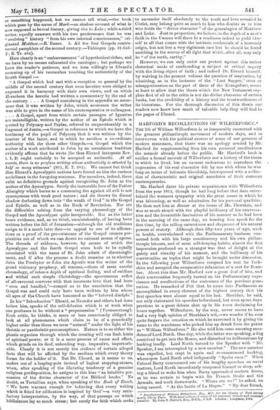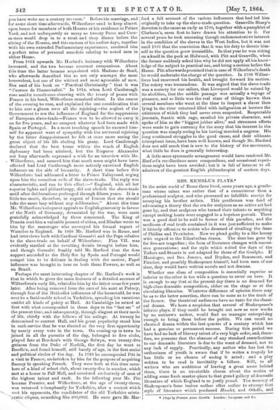HARFORD'S RECOLLECTIONS OF WILBERFORCE.* THE life of William Wilberforce is
so inseparably connected with the greatest philanthropic movement of modern days, and so interwoven with the political careers of some of our greatest of modern statesmen, that there was no apology needed by Mr. Harford for supplementing from his own personal recollections the memoir already before the public. Mr. Harford's book is neither a formal memoir of Wilberforce nor a history of the times in which be lived, but an earnest endeavour to reproduce the impression of his real character felt by one with whom he was long on terms of intimate friendship, interspersed with a collec- tion of characteristic and original anecdotes of their common contemporaries.
Mr. Harford dates his private acquaintance with Wilberforce from the year 1812, though he had long before that date enter- tained the warmest sympathy with the great cause in which he was labouring, as well as admiration for his personal qualities. He then met him at dinner at the house of Mr. Thornton, and was as much struck with the playful brilliancy of his conversa- tion and the irresistible fascination of his manner as he had been in the morning of the same day, on hearing him speak for the first time, by the telling earnestness and eloquence of his natural powers of oratory. Although then fifty-two years of age, weak in health, overwhelmed with the Parliamentary business con- nected both with his large constituency and his own philan- thropic labours, and of most self-denying habits, almost the first impression produced on a stranger was that of delight at the gaiety and vivacity of his manner, and the brilliancy of his conversation on topics that might be brought under discussion. In the following year Wilberforce resigned his seat for York- shire and accepted the comparative relaxation of a seat for Bram- ben. About this time Mr. Harford saw a great deal of him, and their conversation frequently turned on his Parliamentary expe- riences and recollections of the statesmen of the previous gene- ration. He remarked of Pitt that he came into Parliament so accomplished in every element of the highest oratory that his first speeches were almost equal to his last. Sheridan, be said, not only elaborated his speeches beforehand, but even spent days previous to a great debate shut up in his room declaiming for hours together. Wilberforce, by the way, never seems to have had a very high opinion of Sheridan's wit,—we wonder if he ever quite forgave the occasion on which he exercised it by giving his name to the watchman who picked him up drunk from the gutter as "William Wilberforce." He also told him some amusing anec- dotes of Lord North. One day, while the latter was speaking, a dog contrived to get into the House, and disturbed its deliberations by barking loudly. Lord North turned to the Speaker with "Mr. Speaker, I am interrupted by a new member." The new member was expelled, but crept in again and re-commenced barking, whereupon Lord North cried indignantly "Spoke once !" When Colonel Barry commenced one of his lengthy speeches on naval matters, Lord North immediately composed himself to sleep, ask- ing a friend to wake him when Barry approached modern times, as he was certain to begin with Sir Francis Drake and the Armada, and work downwards. "Where are we?" he asked, on being reused. "At the battle of La Hogue." " My dear friend, * Recollections of William Wilberforce, Esq.. M.P. for the County of Tot* during nearly Thirty Tears. With brief notices of some of his personal friends and &pawn- parades. By John S. Harford, Esq., D.C.L., F.H.B. London : Longman, 1864.
you have woke me a century too soon." Before his marriage, and for some short time afterwards, Wilberforce used to keep almost open house for members of both Houses at his residence in Palace Yard, and not unfrequently as many as twenty Pears and Com- moners would drop in to a steak and chop dinner before the sitting of the Houses, and this custom of his earlier days, together with his own extended Parliamentary experiences, rendered him a perfect mine of personal anecdote relating to noted men in either House.
From 1813 upwards Mr. Harford's intimacy with Wilberforce increased, and the two became constant companions. About this time the latter became acqusinted with Madame de Stab who afterwards described him as not only amongst the most benevolent, but one of the wittiest and most agreeable of men. She said of his book on "Practical Christianity" that it was " l'aurore de l'immortalit6." In 1814, when Lord Castlereagh rose amidst tumultuous cheering with the treaty of peace with France in his hand, Wilberforce remained silent. In the course of the evening he rose, and explained the one consideration that to him cast a gloom over all the rejoicing—the neglect of the Government to use the influence of England for the suppression of European slave-trade—France was to be allowed to carry it on for five -years, and no compact whatever had been made with Spain or Portugal. In a most touching speech he excused him- self for apparent want of sympathy with the universal rejoicing by the bitter disappointment he felt at once more seeing the great object of his life eluding his grasp. Lord Castlereagh declared that the best terms within the reach of English diplomacy had been attained, but the Emperor Alexander not long afterwards expressed a wish for an interview with Mr. Wilberforce, and assured him that much more might have been effected had Lord Castlereagh more actively exercised English influence on the side of humanity. A short time before this Wilberforce had addressed a letter to Prince Talleyrand, urging upon him the countless evils of the slave-trade. The reply was characteristic, and ran to this effect:—" England, with all her superior lights and philanthropy, did not abolish the slave-trade until after deliberations prolonged through fifteen years. It is a little too much, therefore, to expect of France that she should take the same leap without any deliberation." About this time Mr. Wilberforce's eloquent appeals to English generosity in favour of the North of Germany, devastated by the war, were most gratefully acknowledged by those concerned. The King of Prussia sent him a valuable present of china, and Blucher wrote to him by the messenger who conveyed his formal report or Waterloo to England. In 1816 Mr. Harford was in Rome, and had interviews both with Cardinal Gonsalvi and the Pope relative to the slave-trade on behalf of Wilberforce. Pius VII. was evidently startled at the revolting details brought before him, and though Gonsalvi frankly told Mr. Harford that the firm support accorded to the Holy See by Spain and Portugal would compel him to be delicate in dealing with the matter, Papal influence was brought to bear on both these Powers, as well as on Brazil.
Perhaps the most interesting chapter of Mr. Harford's work is that in which he gives the main features of a detailed account of Wilberforce's early life, related to him by the latter some few years later. After being removed from the care of his aunt at Putney, through fear of the Methodist influences of the household, he was sent to a fashionable school in Yorkshire, spending his vacations amidst all kinds of gaiety at Hull. At Cambridge he mixed at first with what corresponded in those days to the "fast set" of the present time, and subsequently, through disgust at their mode of life, chiefly with the fellows of his college. At twenty he determined to contest Hull, and his great popularity stood him in such service that he was elected at the very first opportunity by nearly every vote in the town. On coming up to town he joined in all the pursuits of the day, belonged to five clubs, played faro at Brookes's with George Selwyn, won twenty-five guineas from the Duke of Norfolk, the first day Ire went to Boodle's, and found himself, still barely of age, in the first social and political circles of the day. In 1783 he accompanied Pitt in a visit to France, undertaken by him for the purpose of acquiring fluency in speaking French. They were both at this time mem- bers of a kind of select club, about twenty-five in number, which met at a house in Pall Mall, and consisted exclusively of men of the highest talent and rank. In the following year Mr. Pitt became Premier, and Wilberforce, at the age of twenty-three, was returned ti iumphantly for Yorkshire, after a contest which cost his opponents, the candidates of the old Yorkshire aristo-
atic cliques, something like 200,0001. He once gave Mr. Har- ford a full account of the various influences that had led him originally to take up the slave-trade question. Granville Sharp's devotion to the cause as early as 1780, together with a pamphlet of Clarkson's, seem first to have drawn his attention to it. For several years he took unceasing though undemonstrative interest in the condition of the slaves in the West Indies, but it was not until 1787 that the conviction that it was his duty to devote him- self to the question grew irresistible. In that year he was sitting on a knoll in the park at Holwood, with Pitt and Granville, when the former suddenly asked him why he did not apply all his know- ledge of the subject to practical use, and bring a motion before the House. Pitt afterwards promised thatin case of Wilberforce's death he would undertake the charge of the question. In 1789 Wilber- force had recovered his health, and brought forward his motion. The outcry was tremendous. It was argued that the slave-trade was a nursery for our sailors, that Liverpool would be ruined by its abolition, that the middle passage was actually a voyage of pleasure, and so little was the real state of things known that several members who went at the time to inspect a slaver then lying in the river returned filled with indignation at horrors the existence of which they had never even suspected. Respectable journals, frantic with rage, assailed his private character, and spoke of him as the "biggest jobber alive," and strenuous efforts were made to gain currency for the story that his interest in the question was simply owing to his having:married a negress. His long continued struggles in the good cause, and their ultimate triumphant issue, have been well known, and though .Mr. Harford does not add much that is new to the history of the movement, what little he does is generally interesting.
A little more systematic arrangement would have rendered Mr. Harford's recollections more compendious, and occasional repeti- tions might have been avoided ; but it is full of interest to all admirers of the greatest English philanthropist of modern days.































 Previous page
Previous page